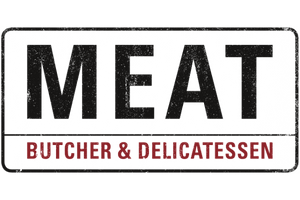Beef
It is a wonderful fact that all across Britain we produce some of the finest beef in the world. From the gorse laden moors of Scotland, to the hilly farms of Wales, and the lush, grass filled fields of England and Ireland, the farmers of Britain produce cattle to an incredibly high standard.
At Meat London, we don’t get too hung up on breeds. Almost by default, much of our beef will be Black Angus from Aberdeen, but we might also have some great Shorthorn, Dexter or Highlands. We are more concerned with the quality of the meat than the breed. We want to know that the animals have lived on the land, feeding naturally on lush grass. We expect our animals to be finished on the land (not in barns) and slaughtered as close to the farms as possible.
On arriving in our shops, we hang the beef for between 20 and 30 days, depending on the cut. We want the beef to age slowly so that the muscles soften and become tender, and dry in order to intensify the flavours, so as to be perfect on the plate.
Lamb
British Lamb. two words to ignite the taste buds. The finest lamb in the Northern hemisphere and more than a match for anything being produced South of the equator.
Sheep are such hardy animals, and easy to keep and rear. The best are left to roam and feed naturally on the rich grasses of country hillsides. Lambs from the more hilly areas of Scotland, Wales and the Lake District might have stronger muscles and a deeper colour, whereas those from the lower, flatter lands of the East of England and Devon and Cornwall might be smaller, and paler in colour.
At Meat London we want to know that the lambs have been kept on the land and well shepherded, so that they will feed well and have a good life. In our shops, we would keep the lambs for a very short period before being butchered and prepared to a standard worthy of the animal itself.
Pork
Pigs are the most fun of the farmyard animals. They are naturally a herding animal and will run and play for hours.
Most of the pork that we have at Meat London comes from the fields of Planation Pigs, on the South Downs in West Sussex. The animals are born on the land and grow slowly outside. They feed very well on root crops, supplemented with cereal pellets at periods when fewer roots are available.
We need the pigs to exercise so as to develop a deep pink flesh colour, with an ample line of fat under the skin to produce more flavours and, of course, the all important crackling.
Poultry
At Meat London, we make no apology for not selling cheap chicken. For us, it’s all about slow, natural growth, fresh air and quality feeding. You can’t rush a good chicken.
The chickens we sell come from farms where the animals have plenty of space to roam and forage for themselves. At night, they are returned to spacious barns, with good bedding, food and water, where they can be protected from predators. Their feed is supplemented with omega rich sileage, and sometimes corn.
Our shops maintain a good supply of ducks, guinea fowl, rabbit and venison and there is usually chicken carcass available for those wanting to make stock or soup.
At festive times we source Turkeys, Geese and Cockerels from the home counties of Essex and Kent. Our chosen farmers concentrate on Free Ranging birds, allowed to roam and feed naturally, ensuring slower growth and encouraging deeper, stronger flavours.
Game
The arrival of the Game Season always sends a ripple through the meat industry and the kitchens of Britain’s finest restaurants. From the ‘Glorious 12th August’ through to the end of January, we produce an abundance of the finest game birds, venison, rabbit and hare. ‘Game’ comes in three categories: furred, feathered and fish.
The term ‘Game’ is generally accepted as the generic term for ‘hunted’. Throughout the world, different countries have different rules and ideas on game, often, of course, dependent on which birds or animals are available. In Britain we control our Game carefully and, although land owners have rights on their own land, most game is shot under license.
